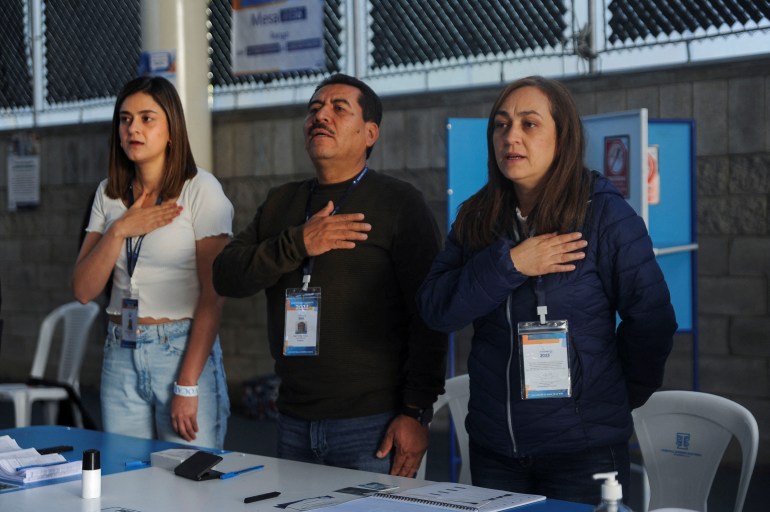Guatemalans head to polls in run-off presidential election
Progressive candidate Bernardo Arevalo faces former First Lady Sandra Torres in a run-off vote.

Guatemalans are casting their votes in a presidential run-off election that many hope will reverse democratic backsliding under recent administrations.
Recent polls have predicted that Bernardo Arevalo, a progressive candidate running on an anti-corruption platform, will defeat establishment figure and former First Lady Sandra Torres.
Keep reading
list of 3 itemsGuatemala voters voice uncertainty ahead of presidential run-off
Guatemala police raid office of Semilla presidential candidate
Arevalo was leading with 50 percent, according to the most recent pre-election poll by CID/Gallup and the Freedom and Development Foundation, with Torres coming in second with 32 percent.
That outcome could usher in a new era after widespread allegations of corruption and creeping authoritarianism in recent years.

Guatemala’s new president will assume power as violence and food insecurity roil the country, triggering fresh waves of migration. Guatemalans now represent the largest number of Central Americans seeking to enter the United States.
“I would like Arevalo to win because he is not the same,” Veronica Campos, a 58-year-old office worker, said after casting her vote on Sunday, according to the Reuters news agency.
“We are in a repetitive cycle. We have been wrong so many times believing in the same politicians.”
The election is being closely watched by the international community, including the US, after campaigning was marred by attempts by some officials to remove Arevalo and his Semilla party from the race.
Arevalo’s unexpected success in the first round was followed by raids against the Semilla party offices and those of electoral officials, prompting the United Nations, the European Union, and the Organization of American States (OAS) to raise the alarm over efforts to undermine the vote.
His surprise second-place finish in June’s first-round vote provoked calls from opponents for recounts that delayed official results. His party was briefly suspended at the request of a prosecutor before the country’s top court reversed the ban.
The political back and forth has put some voters on edge about potential problems during the run-off, which Arevalo has publicly said he is expecting.
Arevalo is the son of the country’s first democratically elected president, Juan Jose Arevalo. When the older Arevalo came to power in 1945, he ended the rule of dictator Jorge Ubico.
‘Expressions be respected’
Outgoing President Alejandro Giammattei has vowed to ensure an orderly vote and transition of power.
But many Guatemalans remain sceptical, having seen the government in recent years expel investigators from a UN-backed anti-corruption body and target judges and anti-corruption campaigners, many of whom fled into exile.
The attorney general who called for Semilla’s suspension had been previously added by the US Department of State to its Engel List of “corrupt and undemocratic actors”.

The OAS said a team of 86 election observers was in the country.
“It is essential that citizens be able to express themselves freely with full guarantees and that their expressions be respected,” said Eladio Loizaga, head of the OAS mission in Guatemala, on Saturday.
Polls will close at 6pm local time (00:00 GMT).